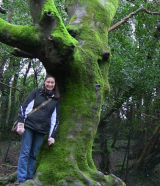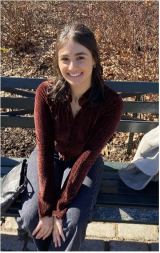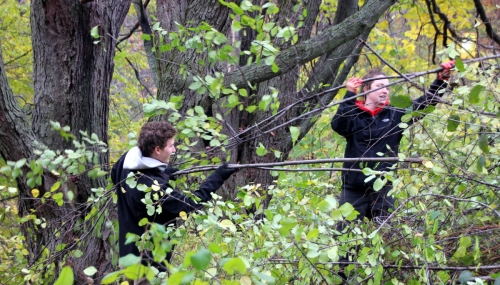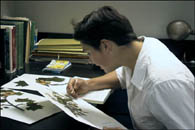Come discover the different volunteering and work opportunities in science outreach at the Macdonald Campus! Join different groups across campus and connect with local communities and schools through your passion for science. Learn to engage different audiences including young children, adults and fellow students with interactive activities and dynamic presentations.
For additional information about the different science outreach opportunities at Macdonald Campus, please contact lister.macdonald [at] mcgill.ca (I)ingrid.chiraz [at] mcgill.ca (ngrid Chiraz).
Volunteering
Let's Talk Science at McGill

Let's Talk Science is a national, not-for-profit organization dedicated to providing "hands-on, minds-on" opportunities to engage youth in STEM.
The McGill Chapter of Let's Talk Science is a volunteer-based group of graduate and undergraduate students from a wide range of faculties at McGill University. Our volunteers deliver hands-on classroom presentations, host public STEM events, mentor for and evaluate projects at regional science fairs, and provide STEM outreach to a range of urban and indigenous schools!
The McGill Macdonald Campus Chapter of Let's Talk Science is looking for new student volunteers to join their team to help with virtual and in-person activities taking place throughout the year!
Both undergraduate and graduate students are welcome to join. No outreach experience required.
Interested in being a volunteer? Please contact: mcgill [at] outreach.letstalkscience.ca for more information or register on our national volunteer portal. Additional information about Let’s Talk Science at McGill University can be found here.
Check out our social media!
- Facebook: facebook.com/LetsTalkScienceMcGill
- Instagram: lts_mcgill
- YouTube: Let's Talk Science at McGill University
Interested in being a volunteer? Please contact: mcgill [at] outreach.letstalkscience.ca
All Let’s Talk Science Outreach volunteers attend an introductory training session that focuses on how to create and deliver impactful, engaging hands-on STEM activities. We cover topics such as theories of learning, how to introduce yourself, and classroom management. Additional optional training and professional development is also offered periodically, both locally and online.
As a volunteer with Let’s Talk Science, you will gain skills and receive training that can be immediately put into practice and will support your early career. You will develop your science communication skills, leadership skills and serve as a role model for Canadian youth ranging from kindergarten to CEGEP!
Meet the coordinators of the Macdonald Campus Team:
 Maxana Weiss (Co-lead & EDIA Coordinator, 2016-)
Maxana Weiss (Co-lead & EDIA Coordinator, 2016-)
I am a PhD Candidate in Rehabilitation Science at McGill University. As a member of the Person-Centered Health Informatics Laboratory(PCHI lab), my current research, part of the BRILLIANT project (https://www.brilliant-cfi.ca/) seeks to distinguish barriers and gaps to building an accessible digital health interface for use by patients with acquired brain injury, their carer(s), and clinicians. My previous research focuses on the biomechanics of work-related tasks and understanding how people of different ages and genders experience fatigue with the hope that this will help minimize work-related musculoskeletal disorders. I am originally from New York and, from an early age, I trained and performed competitively in soccer and karate, while simultaneously training in dance, specifically tap and ballet. I have always been fascinated with human movement and I was introduced to the discipline of biomechanics my first year in undergrad where I studied biomechanics and neuromuscular control of locomotion, as well as the evolution of vertebrate musculoskeletal systems. I completed my B.A. in Neuroscience and Behavior at Mount Holyoke College before coming to McGill. I was a coordinator for Brain Awareness Week at Mount Holyoke and also a member of the Neuroscience Club. I have been with Let’s Talk Science for five years, first as a volunteer, and I am so excited to continue as the Equity, Diversity, Inclusion, and Accessibility coordinator position across the downtown and Macdonald campuses to help organize and bring more programs to students of all ages.
 Sophie Emberley-Korkmaz (Large Events Coordinator, 2022-)
Sophie Emberley-Korkmaz (Large Events Coordinator, 2022-)
Hi! I am a master’s student in the department of Natural Resource Sciences in Dr. Niladri Basu’s Lab at McGill University. My research looks at utilizing a rainbow trout fish gill (RTgill-W1) cell assay to answer ecotoxicological questions without the use of animal testing. Specifically, I study pesticide contamination in the Richelieu River, which is a tributary to the St. Lawrence River. I look at the possible adverse effects of the pesticides identified in this river on the RTgill-W1 cells from lethal and sublethal endpoints to be able to predict these effects on endangered species. Before my master’s, I graduated with a Bachelor of Science in biochemistry from Queen’s University in Kingston, Ontario. I am extremely excited to join the Let’s Talk Science team this year because I love engaging with youth of all ages and hope to incite a passion for nature and science! I look forward to working with the LTS coordinators and volunteers to achieve this.
For more information about the Mac Team of Let's Talk Science at McGill, please contact mac.lts.mcgill [at] gmail.com
Additional information about Let's Talk Science at McGill can be found here.
Morgan Arboretum
![]()

The Morgan Arboretum is a 245 hectare forest reserve, situated on the western end of the island of Montreal in Sainte-Anne-de-Bellevue and has been part of McGill University's Macdonald Campus since 1945. In addition to its teaching and research purposes, it is a recreational facility open to the public throughout the year.
The Arboretum is on the look-out for volunteers interested in spending some time in the great outdoors! Arboretum operations rely heavily on volunteers to maintain the walking trails year-round and to prepare the ski trails and snowshoe trail for the winter season. Projects directly related to forest management such as invasive species management, helping curate the natural collection and blossom corner, and seed collection also require volunteers. For the more physically inclined, the Arboretum also requires some help collecting and splitting firewood from the forest.
For those interested in sharing their passion for nature & wildlife, the opportunity is available to volunteer as an educator and leader for school and public visits as well.
All Arboretum volunteers get fully trained on any equipment they may be using as well as getting informed on the different projects they are involved with. This is a great opportunity to spend some time outdoors, help a local non-profit organization and develop unique environmental experience!
The Arboretum accommodates volunteers with different experiences, backgrounds and interests. If you think you might enjoy helping out, don’t hesitate to reach out to find a project you would love to take part in!
Interested in becoming a volunteer? Please visit: https://www.mcgill.ca/morganarboretum/how-help/volunteering
Additional information about the Morgan Arboretum can be found here.
McGill University Herbarium (Fall 2023)
 The McGill University Herbarium is the oldest research museum of dried plant specimens in Canada. Subarctic orchids, lilies from Ecuador, and medicinal plants gathered from Montreal before it was urbanized are some of the 140,000 botanical treasures showcased at the collection. McGill staff and students alike have been cataloguing natural history at the herbarium for over a century, preserving vouchers essential to understanding both past and present patterns of plant biodiversity.
The McGill University Herbarium is the oldest research museum of dried plant specimens in Canada. Subarctic orchids, lilies from Ecuador, and medicinal plants gathered from Montreal before it was urbanized are some of the 140,000 botanical treasures showcased at the collection. McGill staff and students alike have been cataloguing natural history at the herbarium for over a century, preserving vouchers essential to understanding both past and present patterns of plant biodiversity.
The Herbarium is currently looking for volunteers to work in-person with the collection on Thursdays and Fridays.
Interested in becoming a volunteer? Please contact: frieda.beauregard [at] mcgill.ca (Dr. Frieda Beauregard)
Additional information about the McGill Unviersity Herbarium can be found here.